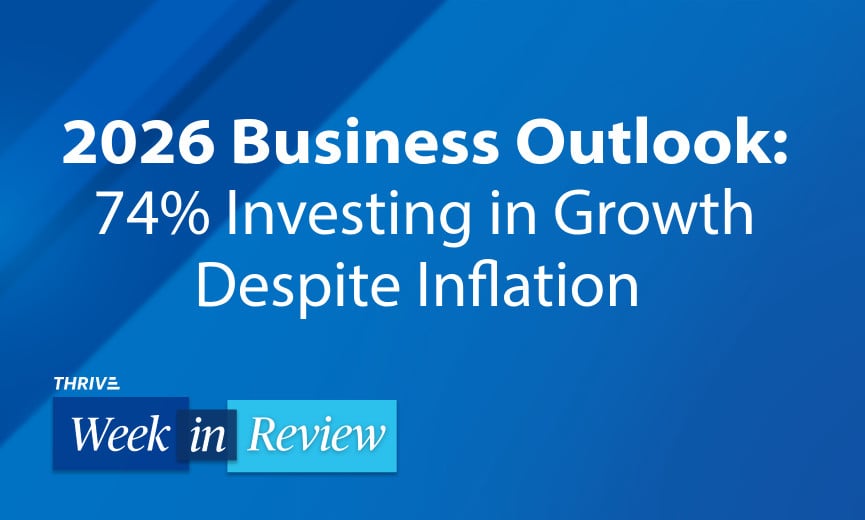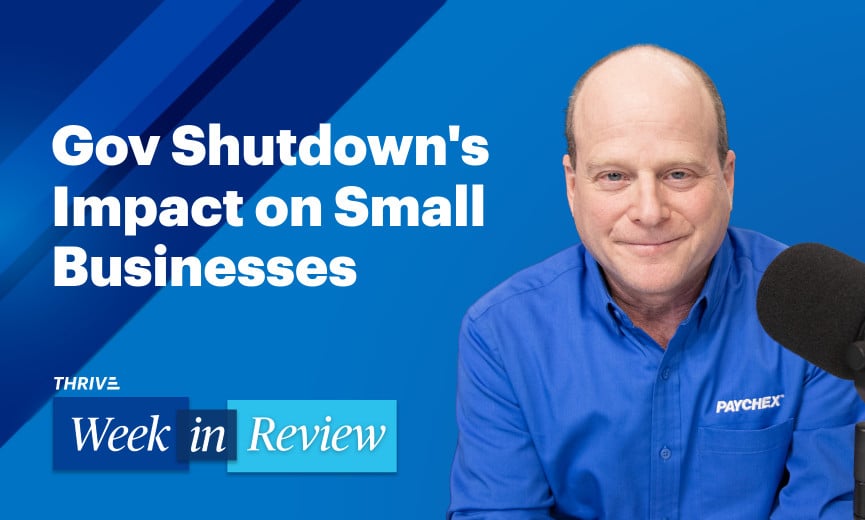- Thrive
-
Temporada
4Episodio93
Caducará la Ley de Reducción de Impuestos, el crédito fiscal busca permanencia y prevención del acoso laboral

Podcast •

Resumen
With tax cuts from 2017 already starting to expire and fully set to sunset in 2025, business owners might be seeing higher tax rates or fewer exemptions on their estates. Gene Marks says this could be significant if Congress doesn’t act. Meanwhile, the New Market tax Credit program is also going to go away in 2025 if it is not made permanent, as will the projects and jobs it funds in rural and urban areas. A comment period has opened on new guidance on workplace harassment, especially around virtual workers. Gene suggests talking to legal counsel and HR experts to update your policies. Listen to the podcast.
Ver transcripción
[Gene Marks, host]
Hey everybody, this is Gene Marks and welcome to this week's episode of the Paychex THRIVE podcast Week in Review. This is the podcast where we take a few items that are in the news this week and discuss how they impact you with a little bit of strategies and all that. So, let's get to it, shall we?
This past week in the Wall Street Journal, there was a great article written by Bailey McCann called Tax Moves to Consider Now Before the 2017 Cuts Expire. So, just to make sure you're aware, this isn't necessarily news that happened this week, but it's looming news that I'm sure we'll be revisiting a lot over the next year or two. That's because the tax law that was passed back in 2017 under the Trump administration, it brought sweeping changes; it lowered individual tax rates, it doubled the standard deduction, it raised the estate tax exemption. But a lot of the law's provisions are set to expire at the end of 2025.
So, if Congress doesn't do anything about this, if they don't extend them or change them or whatever, then we're going to be all facing higher taxes come 2025.
In fact, some of these things are actually happening right now. One of the things to be aware of is depreciation expense. Right now, if you buy assets like a property plant and equipment or a piece of furniture or software hardware, you can only get 80% of that in the first year. The rest has to be amortized. Next year, there's going to 60% and the year after that it goes down to 40%.
In addition, tax rates are going to be going up to their 2017 levels when the law expires in 2025. So, there you're going to see the top tax rate goes to from 37% to 39.6%, as well as other rates will increase, as well.
Also, estate taxes will go up right now when people die, if they're a married couple, they can transfer almost $26 million without triggering any federal estate taxes. It’s an exemption. An individual can transfer up to $13 million without paying any estate taxes.
Well, those numbers are going to go down after 2025. I mean, they're going to be cut roughly in half. So, people that are, you know, leaving estates, are both married, filing jointly and individuals; less is going to be subject to tax exemption.
There's a lot of other things – and again, I'll be covering some of this stuff in the in the months to come – about how some of these expiring benefits and deductions really could have a big impact on small businesses. Keep your eyes open and talk to your tax accountant if there's any moves that you should be making.
Speaking of taxes, in my second news item this week, this comes from the ABA Banking Journal, the American Bankers Association. The American Bankers Association, seven state bankers associations, and multiple banks joined more than 700 organizations in a letter urging President Biden and Congress to permanently extend the New Markets Tax Credit program. They call it an important source of funding for business community developments.
The New Market Tax program has a 20-year track record of financing small businesses, daycare centers, health care clinics, schools and other projects are created more than a million jobs in distressed communities across the group. Unfortunately, that tax credit is set to expire in 2025.
There are two bills before Congress to make it permanent, and we're hoping to see that move forward. But right now, it is set to expire in 2025. That's only a year away, really as we're heading into 2024. So, that's why the ABA and so many others joined in writing this letter to President Biden.
Each year, the New Market Tax Credit finances hundreds of projects, creating over 50,000 jobs in urban and rural communities, the letter said. Tight competition for credits pushes this type of investments towards high impact projects in the most-distressed communities in the country. Community development organizations target the creation of quality jobs with good benefits, most of which are accessible to existing residents of distressed communities.
So, we'll see if Congress does pass any type of law making the New Markets Tax Credit permanent. More on that to come.
Finally, the EEOC has been busy. Last week, the Equal Employment Opportunity Commission released draft enforcement guidance on workplace harassment that it published Oct. 2 in the Federal Register; this is according to a report on Bloomberg Law.
The EEOC’s new guidance addresses evolving changes in workplace and employment case law. The guidance provides current examples of harassment and addresses the proliferation of digital technology and social media postings and other online content that can contribute to a hostile work environment. It also explains the offensive conduct, even if not directed at a complainant, and be actionable.
Finally, the revised guidance makes clear that the Title VII sex-based discrimination as it pertains to pregnancy and other related medical conditions, includes an employee's decision regarding contraception and abortion.
While the guidance remains open for comment until Nov. 1, employers can get a head-start on reviewing and revising their policies. It is time to look at your virtual workplace harassment policy with virtual workers. You should be looking at whether or not your company is exposed to any third-party harassment – that could be people outside of the company that gets involved with your employees, there’s harassment involved. An employee can suffer because of that and that could be your liability. And also, what your rules are around pregnancy, childbirth and related conditions, as well.
All of these are issues that are being raised by the EEOC. There's going to be new rules and new penalties for employers that don't comply. So, you need to be talking to your labor attorneys, your HR experts, your parent company about making sure that you're on top of these things.
My name is Gene Marks, and you've been listening to this week's edition of the Week in Review, a Paychex THRIVE podcast. If you had any voice or tips or help, or if you'd like to suggest guest for our podcast, visit us at payx.me/thrivetopics.
Again, my name is Gene Marks. Hope you enjoyed this week's episode. We will See you again next week with some more news impacting your business and some thoughts on how to navigate around that news. Take care and see you then.
This podcast is property of Paychex, Inc. 2022. All rights reserved.

 Apple Podcast
Apple Podcast Spotify
Spotify iHeartRadio
iHeartRadio








